| West Bali National Park | |
|---|---|
| Taman Nasional Bali Barat | |
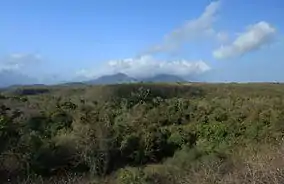 | |
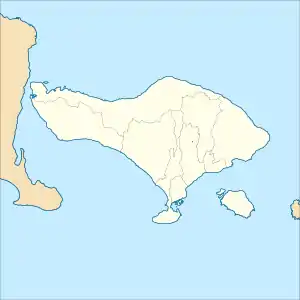 West Bali NP Location of West Bali NP | |
| Location | Buleleng, Bali, Indonesia |
| Coordinates | 8°8′S 114°29′E / 8.133°S 114.483°E |
| Area | 190.02 km2 |
| Established | 1995 |
| Visitors | 5,592 (in 2007[1]) |
| Governing body | Ministry of Environment and Forestry |
West Bali National Park (Indonesian: Taman Nasional Bali Barat) is a national park located in Buleleng Regency, Bali, Indonesia. The park covers around 190 square kilometres (73 sq mi), of which are 158 square kilometres (61 sq mi) of land and the remainder is the sea.[2] This is approximately 3% of Bali's total land area. To the north, it includes a 1,000-metre (3,300 ft) long beach, reef, and islets. A seaport at Gilimanuk is west of the park, and the village of Goris is to the east. The National Park can be reached by roads from Gilimanuk and Singaraja, or by using ferries from Ketapang, East Java.
There are several habitats in the national park, a savanna, mangroves, montane and mixed-monsoon forests, and coral islands.[3] The center of the park is dominated by remnants of four volcanic mountains from the Pleistocene era, with Gunung Patas at 1,412 metres (4,633 ft) its highest elevation.
Flora and fauna
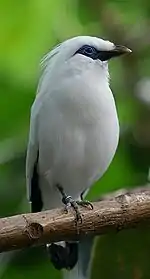
Some 160 animal species can be found inside the park. Mammals include the banteng, rusa deer, Indian muntjac, Javan lutung, wild boar, large flying fox , and leopard cat. Birds include crested serpent-eagle, milky stork, savanna nightjar, barn swallow, Pacific swallow, red-rumped swallow, crested treeswift, dollarbird, black-naped oriole, Java sparrow, lesser adjutant, long-tailed shrike, black racket-tailed treepie, sacred kingfisher, stork-billed kingfisher, yellow-vented bulbul and the critically endangered Bali myna. Reptiles include hawksbill turtle and water monitor.
In June 2011, West Bali National Park received forty Bali mynas released from Surabaya Zoo and twenty from Taman Safari Indonesia.[4]
Plant species known to grow in this national park include Pterospermum diversifolium, Antidesma bunius, Lagerstroemia speciosa, Steleochocarpus burahol, Santalum album, Aleurites moluccanus, Sterculia foetida, Schleichera oleosa, Dipterocarpus hasseltii, Garcinia dulcis, Alstonia scholaris, Manilkara kauki, Dalbergia latifolia and Cassia fistula.
Extinct
- The last Bali tigers were positively recorded in western Bali in the 1930s.[5]
See also
Gallery
 Map of West Bali National Park
Map of West Bali National Park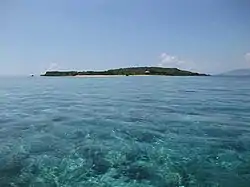
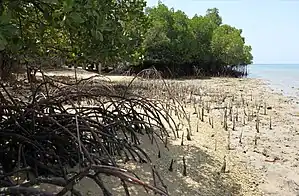 Mangroves in the West Bali National Park
Mangroves in the West Bali National Park A Bali tiger which was killed by M. Zanveld, in the 1920s
A Bali tiger which was killed by M. Zanveld, in the 1920s
References
- ↑ Forestry statistics of Indonesia 2007, retrieved 20 May 2010
- ↑ "Tentang Kami « Taman Nasional Bali Barat (Bali Barat National Park) – Taman Rekreasi, Jalak Bali, Penelitian, Pariwisata". Tnbalibarat.com. Retrieved 2013-07-12.
- ↑ Ministry of Forestry: Bali Barat National Park, retrieved 13 October 2010
- ↑ "Surabaya zoo releases 40 endangered birds into Bali national park", Waspada Online, 18 June 2011
- ↑ Jackson, P.; Nowell, K. (2008). "Panthera tigris ssp. balica". IUCN Red List of Threatened Species. 2008: e.T41682A10510320. doi:10.2305/IUCN.UK.2008.RLTS.T41682A10510320.en. Retrieved 13 November 2021.
External links
- (in Indonesian) Official website